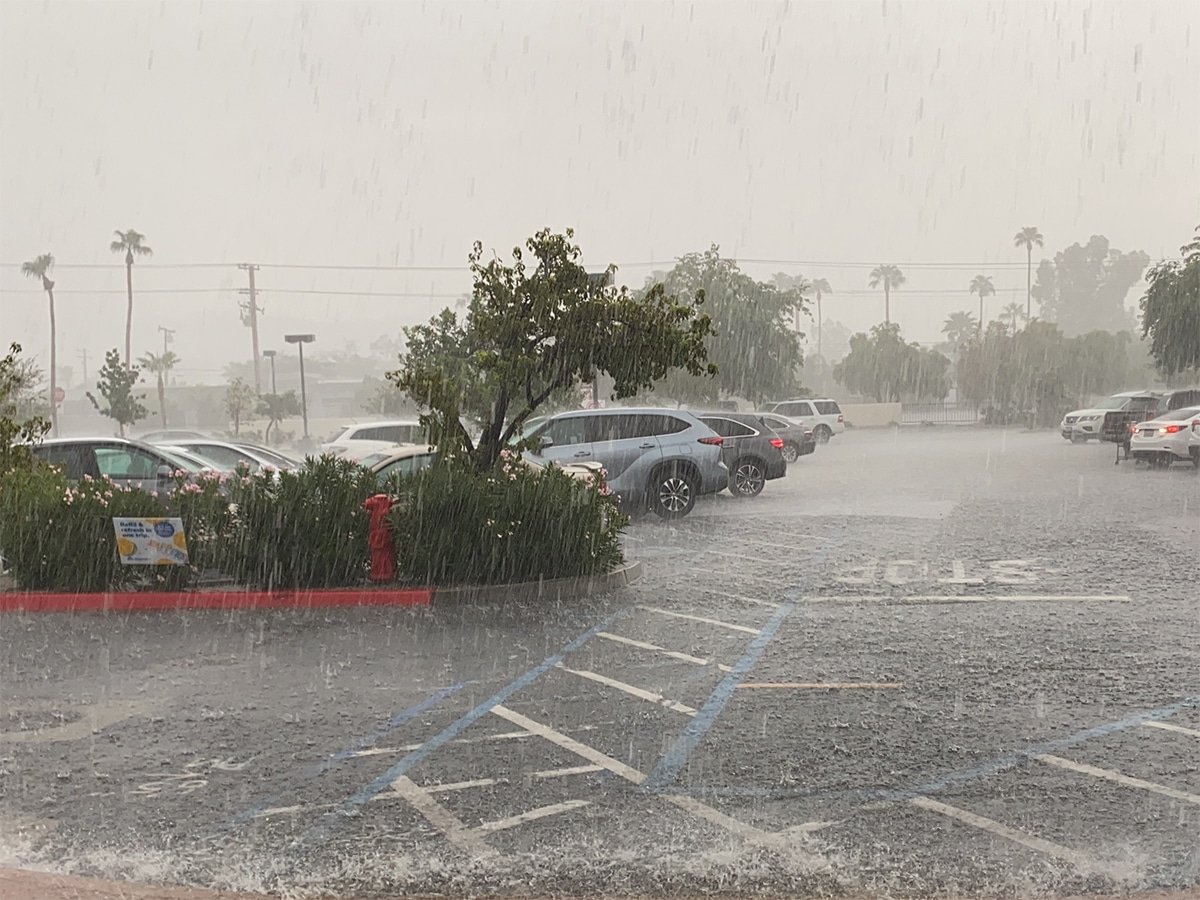It’s hard to believe but my home state of California has just been issued its first-ever tropical storm watch … as if 2023’s weather can’t get any crazier. I just returned home from filling up my gas tank because I’m getting prepared early. While filling up our car, it dawned on me, I should share some expert tips on how to prepare for a hurricane or tropical storm. For instance, these are the 10 items I always have in case of an emergency, not just hurricanes or tropical storms. RELATED: The Hurricane App That Floridians Use and Travelers Should Too

According to AccuWeather, “residents of Southern California are bracing for what could be a once-in-a-lifetime tropical storm landfall. Impacts from Hilary are likely to be highly disruptive, damaging and dangerous, AccuWeather meteorologists warn. Copious amounts of rain, in some places more than would normally fall over the entire year, will trigger tremendous flash flooding. AccuWeather meteorologists are concerned that a life-threatening flooding disaster may unfold in some of the desert areas east of the mountains in Southern California to southern Nevada and western Arizona.”
MLB shuffles Dodgers, Angels, Padres games due to Hurricane Hilary
You know it’s going to be bad if Major League Baseball (MLB) moves games up a day. According to ESPN, “Each of the games — Arizona at San Diego, Tampa Bay at the Los Angeles Angels and Miami at the Los Angeles Dodgers — will now be played Saturday as part of split-doubleheaders.”
According to the Los Angeles Times, “Hilary is currently a category 4 hurricane, but weather forecasters predict it will diminish to a tropical storm by the time it touches down here. A high-risk warning for excessive rainfall has been issued for areas across Southern California.”
Airline travel policies
Air Canada | Alaska | American Airlines | Delta | Frontier | JetBlue | Spirit | United | WestJet | Every airline website and phone umber
Cruise line policies
Carnival Cruise Line | Celebrity Cruises | Disney Cruise Line | MSC Cruises | Norwegian Cruise Line | Royal Caribbean | Cruise Critic
Ground transportation policies
Amtrak | Greyhound
News agencies
ABC | CNN | FOX | NBC | NPR | NOAA’s Hurricane Tracker | USA Today | NY Times | Washington Post | WSJ | Weather.com | Weather.gov
L.A. Residents: When preparing for the storm, take the following actions:
- Secure your outdoor space- move furniture, umbrellas, and other light weight items to indoor or secured areas to ensure they don’t fly away
- Gather emergency supplies that will allow you to shelter in place during the storm, including food, water, radios, medication, and pet supplies
- Prepare for power outages with batteries, flashlights, backup cell phone chargers and charging cables
- Sign up to receive text, email, and phone call emergency alerts for your home, work, and school at www.notifyla.org
- Pick-up sandbags from your local fire station. More information here: https://www.lafd.org/news/lafd-provides-sandbags-homeowners
- Prepare medical devices and cell phones for potential power outages by charging them completely and getting back-up systems ready
- Check in on your neighbors to make sure they know about the storm conditions and are prepared
- Check storm drains where you live and in your neighborhood to make sure they are cleared of debris
During the storm, take the following actions:
- Avoid driving if at all possible. Dangerous road conditions are anticipated throughout the region
- Bring pets inside during the storm to keep them safe from falling debris
- Call 911 for life-threatening situations, such as people trapped by flooding or damaged trees, and debris flows threatening buildings
- If you see flooding, fallen trees, or other significant damage that isn’t immediately life threatening, report it via 311, which will be operating with extended hours during the storm. Call 3-1-1 or visit https://lacity.gov/myla311
- Assume all downed power lines are electrified and dangerous. Report power issues to the Department of Water and Power by calling 1-800-342-5397
- Do not operate generators indoors or in garages. Generator operation tips can be found here: https://www.fema.gov/fact-sheet/use-generators-safely-home
- Monitor www.emergency.lacity.gov/updates for information on the latest storm updates and City response
What’s the difference between a hurricane “watch” and “warning.”
First of all, the CDC recommends you know the difference between a hurricane “watch” and “warning.”
There are two kinds of hurricane alerts:
- A hurricane watch means hurricane conditions (sustained winds of 74 miles per hour [mph] or higher) are possible in a stated area. Experts announce hurricane watches 48 hours before they expect tropical-storm-force winds (sustained winds of 39 to 73 mph) to start.
- A hurricane warning is more serious. It means hurricane-force winds are expected in a stated area. Experts issue these warnings 36 hours before tropical-storm-force winds are expected in the area to give people enough time to prepare for the storm.
- A tropical storm “is a tropical cyclone that has maximum sustained surface winds ranging from 39-73 mph (34 to 63 knots).”
Here’s a list of hurricane preparation tips from the CDC:
- Give yourself more time than usual to prepare your emergency food, water, and medicine supplies. Home delivery is the safest choice for buying disaster supplies; however, that may not be an option for everyone.
- Locate the nearest shelter and different routes you can take to get there from your home. If shelter locations in your area have not been identified, learn how to find them in the event of a stormexternal icon.
- Write down emergency phone numbers and keep them on the refrigerator or near every phone in your house. Program them into your cell phone too.
- Pet owners: Pre-identify shelters, a pet-friendly hotel, or an out-of-town friend or relative where you can take your pets in an evacuation. Local animal shelters may be able to offer advice on what to do with your pets if you are asked to evacuate your home.
Gather emergency supplies
During and after a hurricane, you may need supplies to keep your family safe and healthy. Remember that a hurricane could cut off your power and water supply. You also may not be able to drive because of damage to your car. Roads may be flooded or blocked.
That’s why it’s best to be prepared—stock up on everything you might need now. Be sure to prepare the following:
- An emergency food and water supply.
- An emergency medicine supply.
- Emergency power sources such as flashlights (don’t forget extra batteries).
- Safety and personal items.
- Important documents, including medical documents, wills, passports, and personal identification.
- A fire extinguisher. Make sure your family knows where to find it and how to use it! Read the National Fire Protection Association’s tips for using fire extinguishersexternal icon.
Get your car ready
Make sure you car is ready before the storm hits.
- Fill your car’s gas tank.
- Move cars and trucks into your garage or under cover.
- Always keep an emergency kit in your car.
- Visit Ready.govexternal icon for information on how to prepare your car and what to include in your kit.
If you don’t own a car, consider making plans with friends or family or call authorities to get a ride if you need to evacuate.
Get your family and pets ready
- Go over your emergency plan with your family.
- Keep checking for updates about the storm. Watch TV, listen to the radio, or check online.
- Call the hospital, public health department, or the police about special needs. If you or a loved one is older or disabled and won’t be able to leave quickly, get advice on what to do.
- Put pets and farm animals in a safe place. Read more about pet safety during an emergency.
Get your home ready
- Clear your yard. Make sure there’s nothing that could blow around during the storm and damage your home. Move bikes, lawn furniture, grills, propane tanks, and building material inside or under shelter.
- Cover up windows and doors. Use storm shutters or nail pieces of plywood to the outside window frames to protect your windows. This can help keep you safe from pieces of shattered glass.
- Be ready to turn off your power. If you see flooding, downed power lines, or you have to leave your home, switch your power off.
- Fill clean water containers with drinking water. You’ll want to do this in case you lose your water supply during the storm. You can also fill up your sinks and bathtubs with water for washing.
- Check your carbon monoxide (CO) detector’s battery to prevent CO poisoning
Be ready to evacuate or stay at home
Always listen to authorities regarding whether you should evacuate or stay at home.
If a hurricane is coming, you may hear an order from authorities to evacuate (leave your home). Never ignore an order to evacuate. Even sturdy, well-built houses may not hold up against a hurricane. Staying home to protect your property is not worth risking your health and safety.
You may hear an order to stay at home. If driving conditions are dangerous, staying at home might be safer than leaving.
If you need to evacuate:
- Grab your emergency supply kit and only take what you really need with you (cell phone, chargers, medicines, identification like a passport or license, and cash).
- Unplug your appliances. If you have time, turn off the gas, electricity, and water.
- Follow the roads that emergency workers recommend even if there’s traffic. Other routes might be blocked or flooded. Never drive through flooded areas—cars and other vehicles can be swept away or may stall in just 6 inches of moving water.
- Contact your local emergency management office and ask if they offer accommodations for owners and their pets. Learn more about evacuating with your pet.
If you need to stay home:
- Keep your emergency supply kit in a place you can easily access.
- Listen to the radio or TV for updates on the hurricane.
- Stay inside. Even if it looks calm, don’t go outside. Wait until you hear or see an official message that the hurricane is over. Sometimes, weather gets calm in the middle of a storm but then quickly gets bad again.
- Stay away from windows—you could get hurt by pieces of broken glass or flying debris during a storm. Stay in a room with no windows, or go inside a closet.
- Be ready to leave. If emergency authorities order you to leave or if your home is damaged, you may need to go to a shelter or a neighbor’s house.
More help during hurricane season
- How to Survive a Hurricane in a Hotel Room
- 5 Tips to Help Keep Your Pet Safe in a Hurricane
- You Must Buy Travel Insurance Before a Hurricane Is Named
- The Hurricane App That Floridians and Others Use
- Booking My Dad a Flight out of Florida Ahead of Hurricane Dorian
Want more travel news, tips and deals? Sign up to Johnny Jet’s free newsletter and check out these popular posts: The Travel Gadget Flight Attendants Never Leave Home Without and 12 Ways to Save Money on Baggage Fees. Follow Johnny Jet on MSN, Facebook, Instagram, Pinterest, and YouTube for all of my travel posts.







